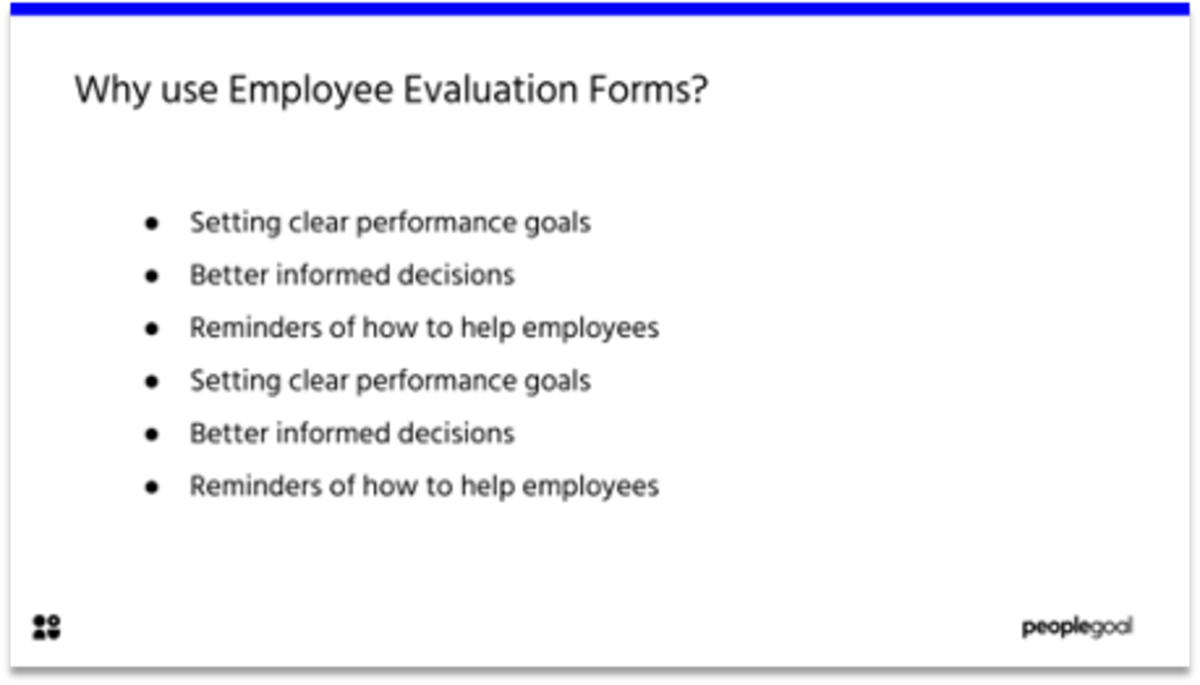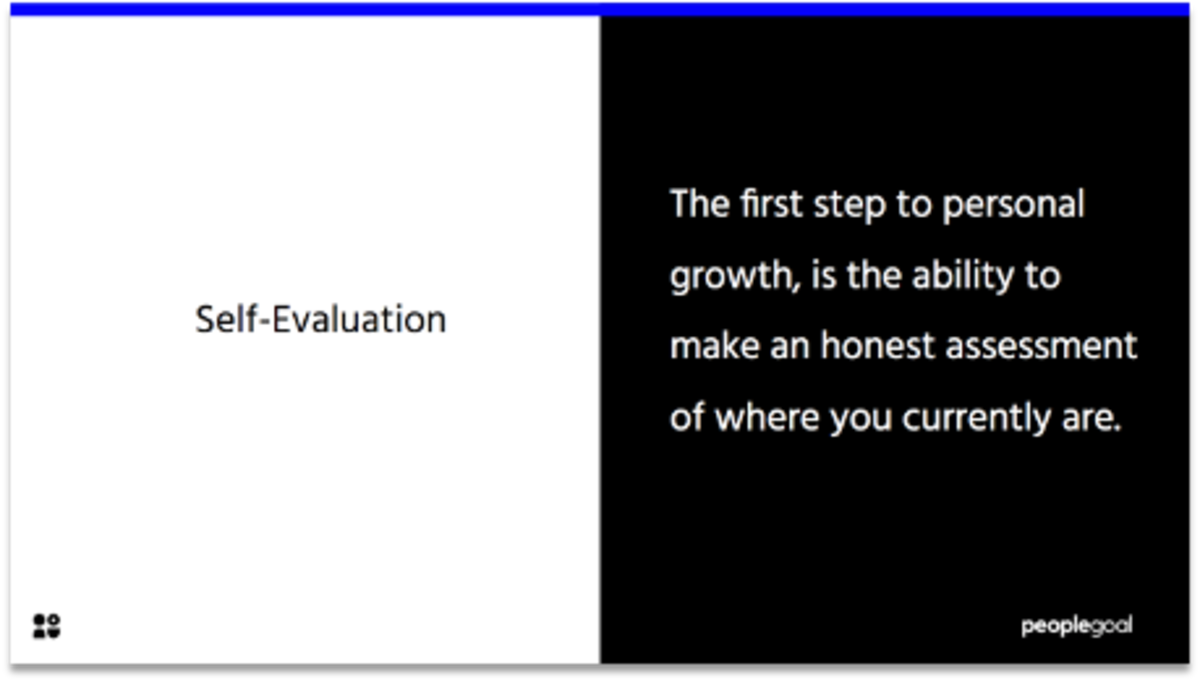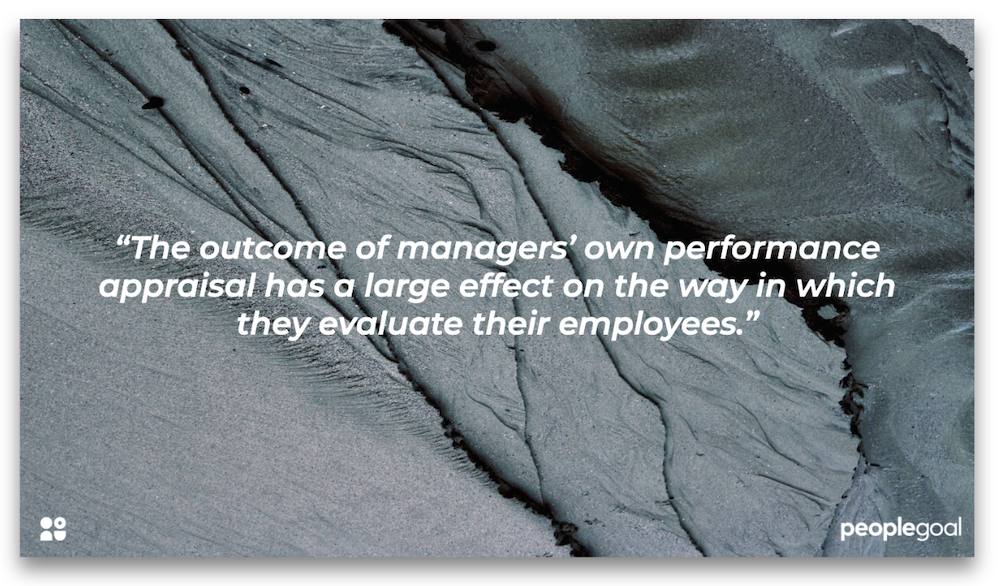Feedback is fundamental to both improving organizational performance and employee engagement. Top performing companies have attained, and retained, their status through persistently learning how to improve themselves.
Effective feedback has benefits for the giver, receiver and the wider organization. Furthermore, feedback is only helpful when it highlights weaknesses as well as strengths.
It appears that the notion we only learn from our mistakes rings true for many workers, as a study found that 63% of employees prefer re-directive feedback over praise. Giving transforming feedback to employees, increases job satisfaction, motivation and productivity. As employees look to improve their working habits, they first set out to establish where they’re going wrong. Evidently, there is a lot of value attributed to employee performance evaluations.

Remote work and Employee Evaluation Forms
For any teams that are working remotely, the review process can be even more difficult. With fewer opportunities for employees to establish how their efforts are received, the use of evaluation forms can provide great insights.
Forms can be produced, completed and submitted electronically from anywhere in the world. As such, there is no restraint on the access employees have for attaining their coveted feedback.
Through using such forms, it leads to the creation of a written record for the feedback, given or received. This makes it possible to track each employee’s development and enables organizations to improve through learning from previous actions.
Following the outbreak of the pandemic, it is also possible to determine the effects of remote working and the response of employees by comparing previous evaluation forms with current ones.
Why use Employee Evaluation Forms?
Beyond the reasons highlighted for its use from the perspective of remote working, evaluation forms are significant for:
- Setting clear performance goals: This directs an employee’s behaviors and actions towards a specific desired outcome. By clarifying the purpose of an employee’s work, this better engages the individual.
- Better informed decisions: Collecting objective data, contributes to more ease in the process of decision-making. A manager can use the evidence presented to them to make better-informed choices in assigning tasks to employees or whatever else.
- Reminders of how to help employees: With a record of every employee evaluation, this provides a mutual benefit for employee and manager/ employer. If employees’ strengths and weaknesses are recorded, this allows for a shared understanding of what role will work best for each employee. Ensuring that each employee is the right fit for the job will also contribute to greater employee engagement.

Measure performance to boost productivity
Employees are more easily motivated when they see the incentives to perform well. By demonstrating that you are intending to measure performance across the entire workforce with employee review forms will give every individual a boost in overall performance. Applying an evaluation process encourages more competitive team members to score well on their rating scale, it also ensures that less engaged workers are made aware of the potential consequences of underperforming.
Furthermore, this presents an opportunity for managers and employees to better understand each other. The use of an employee comments section will create a platform for all involved to discuss their thoughts and opinions about the experience of working for an organization. Additionally, HR professionals can learn from what is shared to improve the overall functions of the organization. They will be able to conduct performance evaluations in a consistent and effective manner.
5 Employee Evaluation Form Templates
Goals-based Evaluation Form
In this first example, the purpose of this form is to rate the performance of employees against the completion of set goals or objectives. With a goals-based evaluation process, it is clear to both the employee and employer how the form measures performance.
This feedback can easily be interpreted by employees as a specific quantitative rating from 1-100. It also provides clear guidance for the next set of objectives for the employee to accomplish within the annual or bi-annual timeframe.
Responses given for this form will be a combination of numerical ratings (in the form of percentages) and verbal responses, such as comments, additional questions and the newly defined goals.
>> Download our Goals-based Employee Evaluation Form.
Self-Evaluation Form
Prompting employees to measure their own performance is significant for both employee and manager. For the employee, it provides an opportunity to contemplate and assess their own experience of work. Whilst for a manager, the employee’s responses will illustrate areas of strength but also importantly, areas where they require more assistance.

Taking the time to record and understand how an employee feels about their work is also necessary to ensure better employee engagement. From the employee’s responses, a manager can address issues that might be preventing individuals from realizing their full potential at work.
Such feedback is an invaluable resource that can be used for the betterment of an entire organization, one employee at a time.
>> Download our Self-Evaluation Form here.
Peer Review Form
Positive relationships between workers are fundamental to the success of any team. When looking to determine how an individual contributes to their team, it is best to find out from those directly affected by their efforts i.e. their teammates.
Through having colleagues and managers assess an employee’s behavior and professional qualities, this will reveal insights from alternate perspectives. As each individual will have a unique judgment, it is important to standardize these reviews. By using a numerical rating scale of 1-5, each person has a clearly defined system to classify their assessment of the employee under review.
By scoring the employee on a numerical scale it is also easier to interpret the data collected. The overall average score can then be fed back to the employee along with any comments, which they can use to better understand how they are received by their teammates.
>> Download here our Peer Review Evaluation Form.

Professional Development Evaluation Form
In observing an employee’s professional development within an organization, this has positive effects for both employee and employer. It will encourage an employee to practice self-development and be autonomous. Each contributing to better employee engagement and ensuring long-term retention.
This performance appraisal form will evaluate the skills necessary for the position in alignment with those demonstrated by the employee. As such it will also reveal the training and support that an employee needs in key areas.
>> Download here our Professional Development Evaluation Form.
End of Probation Evaluation Form
A core part of the onboarding cycle, yet often missed when planning the performance cycle. An end of probation evaluation gives a new employee the chance to record their experience of the time spent settling in and transitioning to a more permanent role.
For an HR department, this is particularly valuable as it provides feedback on the quality of the process. It also reveals where to make the process clearer for future new starters.
>> Download here our End of Probation Evaluation Form.
Summary of Remote Employee Evaluation Forms
We hope that you’ve learned some more about the significance of employee evaluation forms, particularly about their value for remote working. By providing team members with a means to collect and share their experiences, you have the best opportunity to promote their professional development.
Whether gathering responses for an annual performance review or a one-off peer review, these template employee evaluation forms provide you with a great means to understand the overall performance of team members or your organization as a whole. For any human resources department, these review templates will save hours as we’ve already done the work of compiling questions and formatting the forms for you.
Go ahead and download any of our performance review templates and give your organization the best chance of gathering the best responses when you evaluate employee performance. The significance of a good employee performance review is seen in the bountiful feedback gathered as a result.
Ready to 3x Your Teams' Performance?
Use the best performance management software to align goals, track progress, and boost employee engagement.






